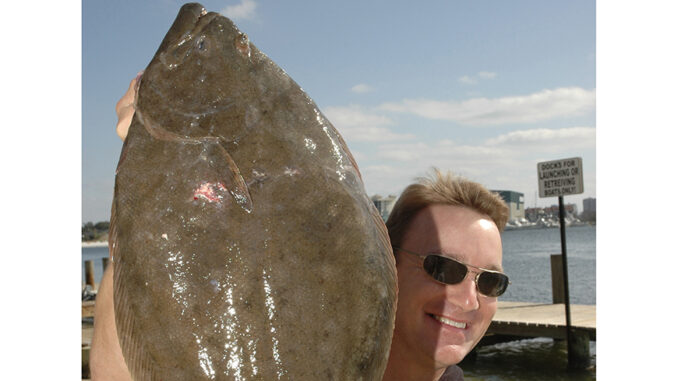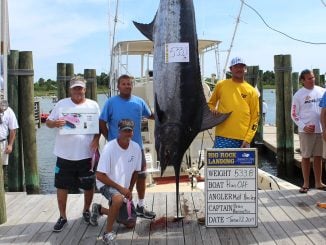
Just before the start of Memorial Day weekend, the North Carolina Marine Fisheries Commission announced there would be no recreational flounder season this year. That means all those sportsmen looking forward to bagging a few flounder later this summer are bound to feel disappointed.
“In order to preserve the southern flounder resource, the North Carolina recreational flounder season will not open for harvest in 2024,” a press release from the N.C. Division of Marine Fisheries (NCDMF) stated, adding the flounder population has been overfished in the southeast coast since at least 2019.
“After subtracting the recreational overage from 2023, the recreational quota remaining for 2024 is not large enough to allow for a season opening,” the press release explained. “The leftover quota will be used to account for the anticipated dead discards that will occur due to incidental catch and release.”
As for the commercial flounder fishing season, a determination has not yet been made, said Patricia Smith, public information officer for NCDMF.
“Recreational and commercial sectors have separate quotas,” she said. “Any overages to the commercial total allowable catch from 2023 will be subtracted from the total allowable catch for the 2024 season to determine the season length.”
Amendment 3 to the Southern Flounder Fishery Management Plan, which was adopted by NCDMF in 2022, set the quotas for the recreational and commercial fisheries, based on scientific data. It was put in place to end overfishing and rebuild the stock, Smith said. “There is a pound-for-pound payback if either sector goes over its quota,” she added.
The quota system, however, seems a little fishy to some recreational fishers.
“It’s no secret that a lot of controversy surrounds North Carolina’s flounder fishery,” said Brian Cope, editor of the website CarolinaSportsman.com.
“In the past few years, the N.C. Division of Marine Fisheries has instituted closures on the species for much of the year, with a short recreational harvest season held during the fall.”
In fact, the 2023 flounder season was just a couple of weeks long, running from Sept. 15-29, with a one fish per person per day caveat.
Cope said despite the brief 2023 season, he’d seen many recreational fishers post large flounder catches on social media “with numerous fish weighing 10-plus pounds.”
“Many anglers took that to mean the strict regulations imposed in recent years are unwarranted, but to others, it shows the regulations are working,” Cope said. “And many point to commercial fishing for flounder, which is allowed to take place during the recreational closure, as the root of the problem.”
For its part, NCDMF explains on its website why commercial fisheries are allowed to fish flounder when recreational anglers cannot.
“The commercial fishery for flounder in the ocean is a trawl-based fishery that targets summer flounder, which is managed by the Atlantic States Marine Fisheries Commission (ASMFC Summer Flounder),” the site says. “The summer flounder stock is not overfished and overfishing is not occurring. The commercial ocean trawl fishery typically occurs in waters off New Jersey through southern New England, outside of the southern flounder range. The summer flounder catch is transported back to North Carolina to offload using North Carolina’s commercial summer flounder quota. Very few flounder are caught in trawls off North Carolina’s coast. Flounder landings from the commercial ocean trawl fishery are almost exclusively summer flounder; this is based off fish house sampling data where NCDMF biologists determine the ID of the flounder sampled.”
North Carolina’s recreational flounder is divided up into three types — summer flounder, southern flounder and Gulf flounder mix. However, most recreational fishers cannot tell the difference between the three, Cope said.
“They all look very similar — almost indistinguishable — to casual anglers,” he explained. “But it’s the southern flounder that’s in decline.”
That’s part of the reason why the Marine Fisheries Commission decided not to open the 2024 recreational season — to help protect the entire flounder population of North Carolina’s coast.
Even with this explanation, Smith said, “Staff at the Division of Marine Fisheries has received numerous emails and phone calls from recreational fishermen, predominantly upset that there will be no flounder season this year.”
For now, recreational anglers will have to wait until next year to get their flounder fix.
The press release states, “Following Amendment 3 and not opening the 2024 recreational flounder season, combined with the increased recreational quota in 2025, should allow enough quota for a recreational season next year.”


